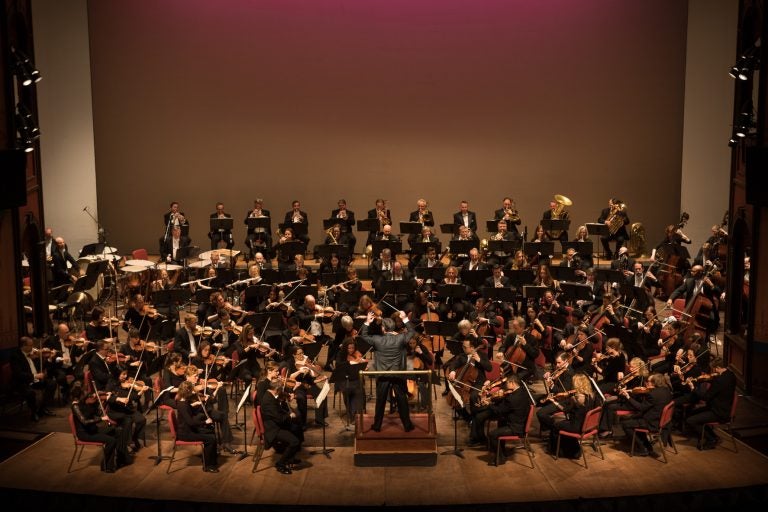Delaware Symphony performs Mahler’s ‘underdog’ work that inspired its future director
Delaware Symphony Orchestra’s director David Amado will lead the group in its first ever performance of Gustav Mahler’s “Seventh Symphony,” which fascinated him as a child.

The Delaware Symphony Orchestra performs at the Grand Opera House in Wilmington. (Joe del Tufo/Moonloop Photography)
David Amado recalls his first encounter with Gustav Mahler’s “Seventh Symphony.” A recording of the work was contained in a set of promotional LPs sent to his mother, a professional musician. The cache included works by Messiaen, Rachmaninoff and Strauss but it was Mahler’s Seventh that caught the ear of the Delaware Symphony Orchestra’s future music director, making a lasting impression.
“It was the first Mahler symphony that entered my consciousness,” said Amado who was about 10 years old at the time. “I wouldn’t say I listened to it over and over, but I did listen to it. It’s always been a fascinating piece to me and one that I’ve gravitated to because it seems to be a little bit of an ‘underdog’ symphony and I like the underdogs.”
Tonight Amado will lead the DSO in a first-ever Delaware performance of Mahler’s Seventh, bringing the orchestra’s 2017-18 season to a close.
The “Seventh Symphony” is the least well-known and the least performed of all of Mahler’s symphonies. But while the Seventh can’t boast the gigantism of the composer’s Third or Eighth symphonies or the euphoria of his First and Second, it is nevertheless a work of invention and sheer musical genius. Plus it’s long enough—about 80 minutes—to fill an evening’s program all by itself.
“It’s filled with such beautiful music,” said Amado. “It’s formally interesting and so progressive. It’s Mahler, but he’s messing around with all sorts of things that composers, even ten, fifteen years later, would just be beginning to latch on to.”
The Seventh, which was composed in 1904-05, is sometimes known as the “Song of the Night,” a title not sanctioned by the composer but one that is not wholly inappropriate. Indeed, Mahler stated that he hoped to convey an atmosphere of wandering by night similar to that in Rembrandt’s painting, “The Night Watch.”
Like its Fifth and Sixth siblings, the Seventh is a purely instrumental work, without the choruses, vocal soloists or programs Mahler wrote for the first four. Its five-movement structure forms an arc, with the sinister-sounding “Scherzo” as its anchor, flanked by the two “Nachtmusiks,” themselves bookended by the vast energy of the outer movements.
Even without an extra-musical narrative, Mahler conveys a nocturnal atmosphere with some dazzling orchestral effects. The first movement opens with the tenor horn sounding a dark, brooding melody. By contrast, the fourth movement, the second “Nachtmusik,” features a mandolin and guitar, two instruments not typically associated with symphonic music. The effect is that of a nocturnal serenade that is at once charming and a bit unsettling.
The symphony’s harmonic structure follows the dusk-to-dawn trajectory of its formal structure. By this time, Mahler’s musical language had advanced far beyond the 19th century Romantic idiom from which it evolved. The piece has an uncertain beginning in E minor but proceeds to a full-blown C major finale. The journey from dark to light occurs via the pivotal “Scherzo” which earned Mahler the support of Arnold Schoenberg. The movement’s abundance of themes based on the interval of a fourth has parallels in that composer’s First Chamber Symphony.
Amado says the final movement, the Rondo finale, is the most challenging from a conductor’s standpoint. Mahler offers the main theme at the beginning and end of the movement while alternating bits of the theme with other bits of music in between. Moreover, the melody is split between several instruments with very specific dynamic markings for color and texture, foreshadowing the Schoenberg technique of “Klangenfarbenmelodie,” or sound-color melody.
“It’s like a Calder mobile of ideas that swing around each other,” he said.
More than 90 musicians will be onstage at Wilmington’s Grand Opera House and for many, this will be their first performance of the Mahler Seventh. “I think everybody’s going to enjoy it,” said Amado. “I think people like the opportunity to do something great and new.”
The DSO performance of Gustav Mahler’s Seventh Symphony will be at the Grand Opera House in Wilmington at 7:30 p.m. tonight. A pre-concert lecture will be held at 6:30 p.m. For more information or to purchase tickets, you can visit www.delawaresymphony.org or call 302-652-5577.
WHYY is your source for fact-based, in-depth journalism and information. As a nonprofit organization, we rely on financial support from readers like you. Please give today.




